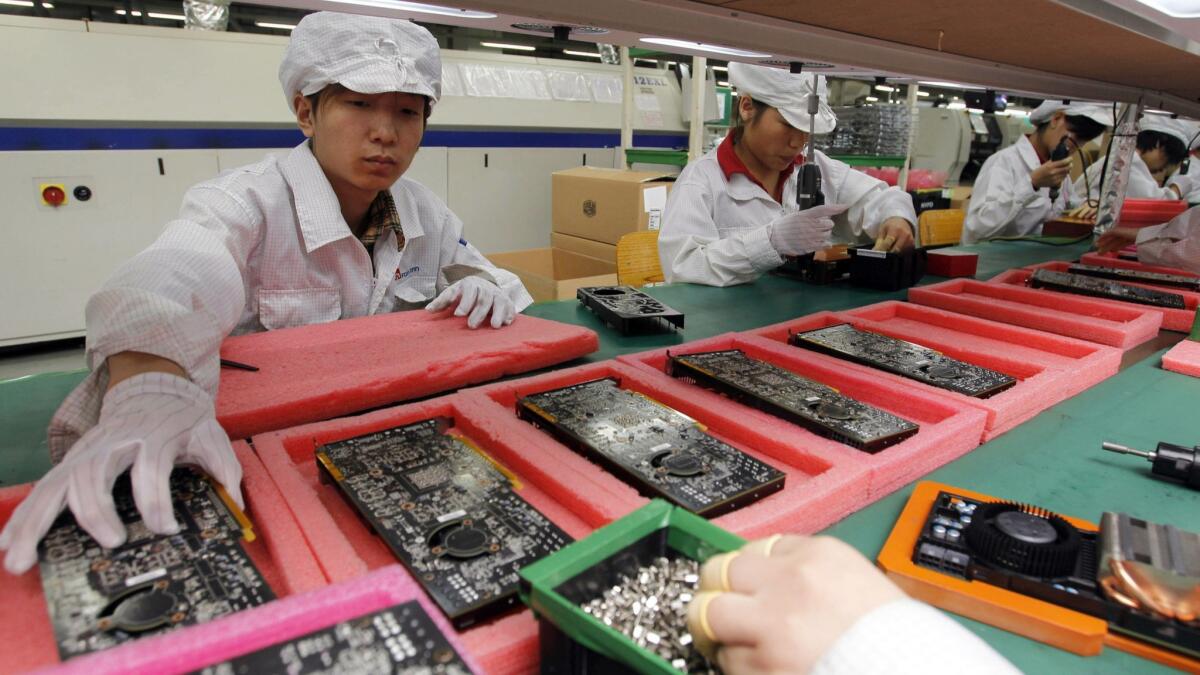Apple’s U.S. iPhones can be made outside China if necessary, Foxconn says

- Share via
Apple Inc. has a backup plan if the U.S.-China trade war gets out of hand.
The Cupertino, Calif., company’s primary manufacturing partner has enough capacity to make all iPhones bound for the U.S. outside China if necessary, according to a senior executive at Hon Hai Precision Industry Co. The Taiwanese contract manufacturer now makes most of the smartphones on the Chinese mainland.
China is a crucial cog in Apple’s business, the origin of most of its iPhones and iPads as well as its largest international market. But President Trump has threatened Beijing with new tariffs on about $300 billion worth of Chinese goods, an act that would escalate tension dramatically while levying a punitive tax on Apple’s most profitable product.
Meanwhile, Alphabet Inc.’s Google is moving some production of Nest thermostats and server hardware out of China to Taiwan and Malaysia, avoiding punitive U.S. tariffs and an increasingly hostile government in Beijing, according to people familiar with the matter.
Google has already shifted much of its production of U.S.-bound motherboards to Taiwan, averting a 25% tariff, said the people, who asked not to be identified discussing internal matters. Server motherboards are among the most crucial to the tech giant’s operations. The company builds its data centers in the U.S. and elsewhere. Those computing hubs help it offer search and productivity tools on a cloud services platform, and power the world’s largest mobile platform as well as services including mapping and search.
Among major U.S. tech companies that operate giant data centers, Google is keener than others such as Facebook, Microsoft Corp. and Amazon.com Inc. to shift server motherboards out of China. Google sometimes procures motherboard components only, while its rivals tend to buy complete server racks from suppliers, one person said. Motherboards are categorized as printed circuit board assembly and face 25% tariffs if they are imported directly into the U.S., whereas server racks as a whole have not yet been affected.
Hon Hai, also known as Foxconn, is Apple’s most important manufacturing partner. It will fully support the tech giant if it needs to adjust production as the U.S.-Chinese trade spat gets grimmer and more unpredictable, board nominee and semiconductor division chief Young Liu said at an investor briefing in Taipei on Tuesday.
“Twenty-five percent of our production capacity is outside of China, and we can help Apple respond to its needs in the U.S. market,” said Liu, adding that investments are being made in India for Apple. “We have enough capacity to meet Apple’s demand.”
Apple shares were up more than 1% to $194.81 in New York on Tuesday.
Apple has not given Hon Hai instructions to move production out of China, but it is capable of moving lines elsewhere according to customers’ needs, Liu said. The company will respond swiftly and rely on localized manufacturing in response to the trade war, just as it foresaw the need to build a base in Wisconsin two years ago, he said.
The U.S. market accounts for 1 in every 4 iPhones sold worldwide, “so it represents a huge portion of Foxconn’s manufacturing business inside China,” Strategy Analytics analyst Neil Mawston said.
Foxconn would need at least one or two big factories outside China dedicated to serving Apple’s U.S. requirements, Mawston estimated. If Foxconn freed up non-China production capacity for iPhones, other smartphone clients could find their orders temporarily delayed or sidelined in the short term, he added.
Foxconn could shift some overseas work back to China to compensate. But without that, some of its Chinese factories may be idled.
And it’s not just about the simple assembly of finished goods. The trade war has disrupted a complex global supply chain involving many countries beyond China and the U.S. Many components that go into devices aren’t made in the U.S. despite being designed there. A phone chip designed by Apple may come out of a factory in Taiwan, then be packaged (a process that prepares it for integration into a circuit) somewhere else, before being shipped to China for assembly into an iPhone.
“It would be relatively easy to shift final assembly of the iPhone outside China, but moving to full production of the components and the whole handset would be much tougher,” Mawston said.
It’s unclear whether India will ever become a major production base for Apple’s marquee device. Foxconn is running quality tests for the iPhone XR series there and plans to begin mass production at a facility in the suburbs of Chennai. Older models are already assembled at a Wistron Corp. plant in Bangalore.
Foxconn has also agreed to build a 13,000-worker facility in Wisconsin in exchange for more than $4.5 billion in government incentives. But that project has come under criticism for low-paying jobs, sudden dismissals and ever-changing goals. On Tuesday, executives reaffirmed that employment goal, saying that construction remained on schedule and that it will hire as many as 2,000 Americans by the end of 2020.
It will also start making networking and server products for the U.S. market by the end of next year, on top of LCD panels starting next year, Liu said.
More to Read
Inside the business of entertainment
The Wide Shot brings you news, analysis and insights on everything from streaming wars to production — and what it all means for the future.
You may occasionally receive promotional content from the Los Angeles Times.









